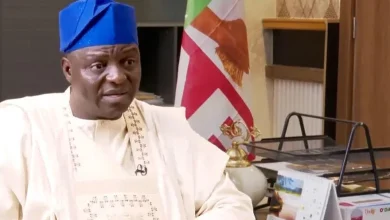Naira Goes Global Anew: Card Usage Freed Up as CBN Reforms Boost Foreign Exchange

Nigerian banks have started accepting overseas payments using naira-denominated debit cards again, marking a significant turning point that indicates a revived sense of trust in the nation’s economy after years of stringent limitations brought on by dollar shortages and unstable foreign exchange.
The Central Bank of Nigeria’s (CBN) reforms under Governor Olayemi Cardoso are clearly working, as seen by this breakthrough.
The decision to re-enable worldwide card usage by a number of prominent institutions, such as United Bank for Africa (UBA), FirstBank, Guaranty Trust Bank (GTBank), and Wema Bank, signifies a noticeable improvement in the foreign exchange liquidity of the nation.
In addition to being a financial development, it represents a more general trend toward economic normalization following years of inconsistent policies, two different exchange rates, and a shortage of dollars on the official market.
This is a great relief for customers, students, tourists, small enterprises, and tech-savvy entrepreneurs that rely on receiving payments from overseas for services, subscriptions, shopping, or business tools.
The protracted freezing
Nigerian banks started to impose restrictions on using naira cards for foreign transactions in 2020.
Shocks to the price of oil, a severe lack of foreign exchange inflows, and an increasingly erratic FX management system all contributed to the decision.
Many banks simply suspended dollar access via naira cards as reserves thinned and the CBN found it difficult to fulfill its forex obligations. They had to open domiciliary accounts and obtain foreign currency from the unstable and frequently exploitative black market in order to pay for products and services overseas, such as Netflix, Amazon, Spotify, Zoom, or Udemy.
Eventually, some banks stopped all cross-border transactions unless they were financed with real dollar deposits, while others set extremely low spending limitations of as little as $20 to $100 per month. In particular, computer workers, international students, frequent travelers, and SMEs involved in international trade suffered greatly as a result.
A watershed
President Bola Tinubu’s appointment of Olayemi Cardoso as Governor of the Central Bank of Nigeria in 2023 marked the beginning of a change in the tide. Addressing the breakdown of the foreign exchange market and reestablishing the legitimacy of Nigeria’s monetary policy framework were among Cardoso’s first moves.
A willing-buyer, willing-seller methodology was implemented to reduce distortions, Cardoso and his team swiftly unified the many exchange rates that had been plaguing the system, and cleared a backlog of more than $7 billion in unmet FX obligations.
Investors and the market were strongly informed by these audacious measures that Nigeria was committed to macroeconomic stability, budgetary restraint, and transparency.
Attempts to draw in monies from both conventional and unconventional sources were another important step. This involved fostering diaspora remittance routes, enhancing naira liquidity availability for money transfer companies, liberalizing requirements for capital importation, and broadening the purview of International Money Transfer Operators (IMTOs).
The net foreign exchange reserve position of Nigeria increased from $3.99 billion at the end of 2023 to $23.11 billion by the middle of 2025 as a result of these actions taken together. The same time frame saw a rise in gross external reserves from $33.22 billion to $40.19 billion.
Banks reactivate Naira cards so they can be used abroad.
Nigerian banks started reintroducing cross-border capability for naira debit cards as dollar liquidity improved and the naira steadied out in the official market.
The relaxation of restrictions was formally announced by a number of large banks in May and June of 2025.
In a notification to consumers, UBA stated: “International transactions are now possible with all UBA Premium Naira Cards, including Gold, Platinum, and World tiers. This implies that you can easily and conveniently use your card for international POS, ATM, internet shopping, and regular payments.
“Your Wema Naira Mastercard just went global!” Wema Bank declared in response. You may now pay in US dollars on all of your favorite international websites, including YouTube, Netflix, Spotify, eBay, Amazon, and AliExpress.
With its naira Mastercard, FirstBank reinstated a $500 monthly foreign spending limit, and GTBank brought back a $1,000 quarterly international spend cap across online and point-of-sale channels, with a $500 ATM withdrawal cap.
These changes in policy show banks’ increased trust in the stability of foreign exchange inflows and better access to the official market for dollar-denominated obligation settlement.
Benefits: SMEs, consumers, and the digital economy
There are numerous benefits to the reintroduction of foreign transactions using Naira cards.
Customers no longer have to deal with the hassle of changing naira to dollars informally or depending on friends or family to complete basic internet transactions, which is especially beneficial for young professionals and digital natives. One can now use personal cards to directly access services like Amazon, Spotify, Netflix, and YouTube Premium.
For independent contractors, IT professionals, and content producers, the modification lowers overhead expenses and simplifies payments for digital advertising platforms, SaaS tools, and subscriptions.
Entrepreneur Temitope Adedayo, who is headquartered in Lagos, stated, “I rely on Adobe Creative Cloud, Canva Pro, and domain hosting for my internet design firm. The past three years have required me to engage third-party agents or contact my relative in another country for assistance with payments. The fact that I can now just use my GTB naira card is a tremendous comfort.
Read Also: “My Dear Elder Brother” Obi Sends Emotional Birthday Message to Gov. Soludo
SMEs also profit from the restored card capability, particularly those that import raw materials, make reservations, or handle international logistics.
The strengthening of the forex market
A more robust structure of the FX market is the fundamental force behind these advances.
In May 2025, Nigeria’s monthly foreign exchange inflows reached $5.96 billion, a 62 percent rise over the previous month, according to analysts at Financial Derivatives Company Limited. Rising oil revenues and the CBN’s more accommodating foreign exchange policy were cited as the reasons for the spike.
By tightening monetary policy, limiting speculative demand, and lowering arbitrage incentives, the central bank has also kept the exchange rate steady.
According to Agusto & Co.’s Head of Financial Institutions Ratings, Ayokunle Olubunmi:
The banks decided to resume international spending because of the decreasing premium between the official and parallel markets as well as the decreased arbitrage opportunities. It indicates a recovery in the FX market.
CBN’s dedication to reform
Without a question, CBN Governor Olayemi Cardoso is still dedicated to sustainability and long-term change.
He recently discussed the macroeconomic prognosis for Nigeria, saying: “Our goal is to rebuild trust and openness. The foreign exchange market’s current success, which includes increased reserves, reopened card usage, and improved business access, is the consequence of diligent, hard effort. We shall continue down this route.
In an effort to further boost market efficiency, the CBN has declared plans to introduce an electronic forex matching system that will promote price discovery, accountability, and transparency in the currency market.
Additionally, the apex bank has pledged to conduct prudent reserve management, determine currency rates based on market forces, and implement policies that put investor stability and trust first.
Obstacles to Come
Although it is a significant victory that international naira card usage has resumed, experts caution that Nigeria must continue to exercise caution to prevent reverting to older practices.
Read Also: “My Dear Elder Brother” Obi Sends Emotional Birthday Message to Gov. Soludo
This development is positive, but sustainability hinges on sustained inflows, openness, and prudent financial management, stated Muda Yusuf, CEO of the Centre for the Promotion of Private Enterprise. Any disruption might undo the advantages, whether it comes from low oil prices, debt repayment, or a lack of coordination in policy.
Deepening non-oil foreign exchange revenues, enhancing tax collection, and guaranteeing fiscal discipline are also necessary to maintain stable external balances.
increasing stability and access to finance
The CBN’s future goals include further liberalizing the foreign currency market, improving digital payments, and expanding financial inclusion.
Aminu Gwadabe, the president of the Association of Bureaux De Change Operators of Nigeria (ABCON), commended the measures and urged greater federal agency coordination.
The forex market is getting more investor-friendly, but we also need to make sure that retail users, including tourists, students, and small businesses, can access forex in a way that is organized, predictable, and reasonably priced, he stated.
Additionally, Gwadabe emphasized the value of diaspora remittances, which generate roughly $23 billion a year, and advocated for more creative goods to draw inflows via official channels.
One sign of normalcy in the economy
Importantly, reactivating Naira debit cards for use abroad is more than just a publicity stunt for banks. It is a potent symbol of better monetary coordination, more FX liquidity, and reestablished market trust.
The ability to engage in a global economy is a source of convenience, accessibility, and independence for millions of Nigerians. It is evidence that Nigeria can create a more resilient and inclusive financial future through sensible reforms, transparency, and discipline, which will benefit the entire economy.
The return of foreign naira card use is a positive indication that Nigeria is headed in the right direction and that more victories are to come with continued reform, according to economist Cyril Ampka, even if the country’s path to complete economic stability is far from ended.





